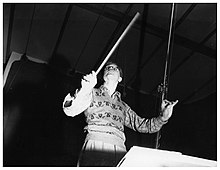Douglas Lilburn

Douglas Gordon Lilburn (* 2. November 1915 in Whanganui; † 6. Juni 2001 in Wellington) war ein neuseeländischer Komponist.
Leben
Lilburn wuchs auf der Farm von Drysdale auf Neuseelands Nordinsel auf. An ein Musikstudium in Christchurch (dort gewann er 1936 einen von Percy Grainger initiierten Kompositionspreis) schloss sich ein Studium der Komposition am Londoner Royal College, unter anderem bei Ralph Vaughan Williams, an. 1940 kehrte Lilburn nach Neuseeland zurück und ließ sich in Christchurch nieder. 1947 kam er als Lehrer an das Victoria College, heute die Victoria University of Wellington. Dort hatte er ab 1970 eine Professur inne. Lilburn war wesentlich am Aufbau des neuseeländischen Musiklebens beteiligt.
Werk
Lilburns Kompositionsstil war zunächst stark von der europäischen Spätromantik beeinflusst. In den 1950er Jahren griff er auch Elemente der Zwölftonmusik und des Serialismus auf. Nach 1960 schrieb er kaum noch Werke für konventionelle Besetzungen, sondern befasste sich fast ausschließlich mit elektronischer Musik.
Werke (Auswahl)
- Forest (Tone Poem) (1936). Uraufführung am 25. Mai 1937 durch das Wellington Symphony Orchestra unter Leon de Mauny (1885?-1952).[1]
- Drysdale Overture (1937)
- Kantate „Prodigal Country“ (1939)
- Festival Overture (1939)
- Aotearoa Overture (1940), Uraufführung durch Warwick Braithwaite.[2]
- A Song of Islands (Tone Poem) (1946)
- Diversions für Streichorchester (1947). Uraufführung durch das Boyd Neel Orchestra.[3]
- Sinfonie Nr. 1 (1946–1948). Uraufführung am 12. Mai 1951 durch das National Orchestra unter Michael Bowles (1909–1998).[3]
- Sinfonie Nr. 2 (1951)
- Suite for Orchestra (1955). Auftragswerk der Auckland Junior Symphony unter Charles Nalden (1908–2002).[4]
- A Birthday Offering (1956), komponiert anlässlich des zehnjährigen Bestehens des National Orchestra of the New Zealand Broadcasting Service.[1]
- Sinfonie Nr. 3 (1960/61)
- zahlreiche Werke für Streichorchester
Einzelnachweise
- ↑ a b J. M. Thomson: The Three Symphonies of Douglas Lilburn. In: Douglas Lilburn, The Three Symphonies. CL Continuum Ltd., [s. l., New Zealand] 1994. Best.-Nr. CCD 1069. S. [3].
- ↑ J. M. Thomson: The Orchestral Music of Douglas Lilburn. In: Douglas Lilburn, Orchestral Music. Continuum NZ Ltd., [s. l., New Zealand] 1996. Best.-Nr. CCD 1076. S. [1].
- ↑ a b J. M. Thomson: The Three Symphonies of Douglas Lilburn. In: Douglas Lilburn, The Three Symphonies. CL Continuum Ltd., [s. l., New Zealand] 1994. Best.-Nr. CCD 1069. S. [4].
- ↑ J. M. Thomson: The Orchestral Music of Douglas Lilburn. In: Douglas Lilburn, Orchestral Music. Continuum NZ Ltd., [s. l., New Zealand] 1996. Best.-Nr. CCD 1076. S. [3].
Weblinks
- Tonträger von Douglas Lilburn im Katalog der Deutschen Nationalbibliothek
- Douglas Lilburn. Lilburn Trust, abgerufen am 30. November 2015 (englisch).
- Douglas Lilburn – The Landscape of a New Zealand Composer. Archiviert vom am 14. Oktober 2008; abgerufen am 30. November 2015 (englisch).
- Douglas Gordon Lilburn. Musicalics – The Classical Composers Database, abgerufen am 30. November 2015 (englisch).
| Personendaten | |
|---|---|
| NAME | Lilburn, Douglas |
| ALTERNATIVNAMEN | Lilburn, Douglas Gordon (vollständiger Name) |
| KURZBESCHREIBUNG | neuseeländischer Komponist |
| GEBURTSDATUM | 2. November 1915 |
| GEBURTSORT | Whanganui |
| STERBEDATUM | 6. Juni 2001 |
| STERBEORT | Wellington |
Auf dieser Seite verwendete Medien
Autor/Urheber: Archives New Zealand from New Zealand, Lizenz: CC BY-SA 2.0
Douglas Lilburn (Order of New Zealand) was born in Whanganui on the 2nd November 1915. Until his death in 6 June 2001, he was New Zealand’s preeminent composer, often referred to as the “grandfather of New Zealand music”. He attended the Royal College of Music, London, where he studied under Ralph Vaughan Williams. Upon his return to New Zealand, he taught and worked as a freelance composer in Christchurch, before moving to Wellington to teach at Victoria University.
In 1963 he founded the electronic music studio, the first of its kind in Australasia. In his later years Lilburn helped establish the Alexander Turnbull Library Archive of New Zealand Music, alongside the Lilburn Trust. This was in an effort to both preserve New Zealand’s musical heritage and to foster young artist to develop New Zealand’s musical future. This photo comes from the Weekly Review No. 332 (1948) . It is captioned “ Douglas Lilburn , composer of special music for a film on New Zealand backblock medical services, is shown directing members of the National Symphony Orchestra.”
Reference: AAPG 25263 W3939 24/D.4 (R2843859)
For updates on our On This Day series and news from Archives New Zealand, follow us on Twitter twitter.com/ArchivesNZ
Material from Archives New Zealand